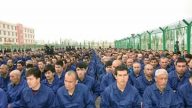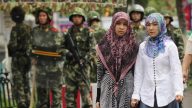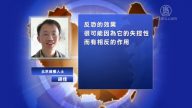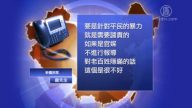【新唐人2013年07月06日訊】最近新疆吐魯番以及和田爆發流血衝突事件之後,中共政治局常委俞正聲及政法委書記孟建柱趕到新疆親自「維穩」,展現中共對新疆維穩更加強硬的作風。北京「中央民族大學」維吾爾族學者伊力哈木.土赫提警告,中共當局一味的打壓,只會形成新疆民族更強烈的反彈。他呼籲當局要調整政策,才不至於發展成一個民族的對抗。
7月5號是新疆烏魯木齊七五事件4週年,每年這個時候,中共當局都會出動大批武警部隊及裝甲車加強巡邏。據人權組織透露,新疆多個政府部門電腦網路被切斷,公務員電話、手機不能發放及接收短訊。而在烏魯木齊市遊客眾多的國際大巴扎市集,一群武警手持槍械和盾牌、頭戴鋼盔在街頭四處走動。
駐疆武警部隊還舉行了萬名軍警、百輛裝甲的演習,同時,自治區公安廳發佈通緝令、收繳刀具以及提供懸賞,加大對所謂可疑人士的打擊力度。
北京中央民族大學副教授伊力哈木.土赫提(Ilham Tohti)則批評北京當局在他的家鄉新疆,實施嚴厲的高壓措施,並且煽動族群不和。
來自新疆,一向敢言並且倡議維護維吾爾族權益的土赫提,7月5號在維吾爾在線網站發表文章說,「我了解我的民族,這個民族是有夢想的,這個民族是有很強的歷史文化、民族傳統。他如果不被尊重的話,在這個開放的年代,一個互聯網的時代,這個民族他可能會走向全面的對抗。」
雖然中共當局把6月底在吐魯番與和田發生的事件,定義為所謂的暴力恐怖事件,但世界維吾爾人大會發言人迪裡夏提則指責說,這是中共的高壓政策導致的民眾反抗。
時事評論員藍述表示,新疆維族人面臨的不只是中共的壓迫,他們還要承受信仰和種族的被欺壓,在這種情況下,維族人的反抗自然會比其他地區的漢族人民來的激烈。
時事評論員藍述:「中共在新疆如果壓制不住這種反抗的話,很可能其他省分的漢族人會以它為榜樣,進行更大規模的反抗,這是中共最害怕的東西。所以說,中共派出大批的警力和軍力,用宣傳機器把這個少數民族的人民和中共之間的對立,把它說成了一個主權問題。」
藍述認為,新疆維族人的要求被說成是主權問題,反抗說成恐怖行動,中共的目地是挑起族群對立,讓內地一些不了解真相的民眾,對新疆維族人產生仇恨。
同時,北京維權人士胡佳也表示,現在中國最主要的矛盾,是黨民矛盾,是來自於這群手裡握著刀把的共產黨員對人民的壓迫。而新疆事件,當局雖然加強了警力部署,但仍無法制止流血事件的發生,說明有越來越多的維吾爾人願意冒生命危險,反抗中共的鎮壓。
胡佳:「這個矛盾,意識衝突,也許敢怒不敢言,但他不敢言的時候,並不代表他心裡沒有這種怒火。如果不走民主化的話,中國就是這一黨專政的情況下,只會陷入恐怖和暴力,只會採取鎮壓的形式讓民族矛盾越來越激烈,越來越血腥。」
2009年7月5號,新疆烏魯木齊市發生了大規模的流血衝突事件,官方公開的數字表示,在衝突中有197人死亡,1721人受傷。由於事發後,中共立即封鎖了消息,所以真實死亡人數至今仍然是個謎。
採訪/易如 編輯/黃億美 後製/郭敬
Scholar criticized the Chinese Communist Party’s “suppression-only” policy in Xinjiang
Last week two violent clashes broke out in Turpan and
Hotan, Xinjiang province.
After that, the Chinese Communist Party (CCP) politburo
standing committee member Yu Zhengsheng and secretary
of Politics and Law Commission Meng Jianzhu went there
to command the “stability maintenance battle” in person.
This indicates a tougher attitude of the Party toward
Xinjiang’s ethnic issue.
Ilham Tohti, a Uyghur scholar at Minzu University of China
in Beijing, warned that CCP suppression will only result in
stronger resistance from the Uyghur people.
Tohti called on the CCP leaders to change its policy to
avoid antagonizing the whole ethnic group.
July 5th is the 4th anniversary of the July Ürümqi Riots in 2009.
Every year around this time, the CCP sends out many armed
police and armored vehicles to tighten its control over Xinjiang.
According to some human rights organization, the Internet
of many governmental agencies had been cut off.
Mobile phones of governmental employees also stopped
sending or receiving messages.
At Ürümqi’s Xinjiang International Grand Bazaar, armed
police with firearms, shields and helmets patrol the streets.
The Xinjiang Armed Police Force also held a drill with
thousands of police and hundreds of vehicles.
In the meantime, the provincial public security department
issued an order for collecting knives from local residents.
It also offered awards for information of “suspicious
individuals” as part of a firmer crackdown.
Ilham Tohti, criticized the CCP for applying the coercion policy
in his home province and making conflicts among ethnic groups.
Tohti, a Uyghur, is famous for his courage of publicly
speaking out for Uyghur people’s rights.
On July 5th, He published an article on the website
Uyghur Online (uighurbiz.net).
Tohti wrote that: “I know our people very well.
This is a group with their own dream and strong feelings
of ethnic culture and historical tradition.
If given no respect, the Uyghur people may fight back in
every aspect in this open age of the Internet.”
The CCP defined the June clashes in Turpan
and Hotan as “terrorist incidents”.
As a rebuttal, Dilshat Reshit of the World Uyghur Congress
said the clashes were Uyghur peoples’ resistance
against the CCP’s coercion policy.
Political commentator Lan Shu remarked that,
the Uyghur people were suppressed by the CCP not only
in politics, but also in religion and ethnicity.
In such a situation, their resistance is certainly stronger
than that of other Han Chinese.
Lan Shu: ”If the CCP fails to crack down on the Uyghur people,
probably other Han Chinese will follow and resist in even larger scales.
This is why the CCP is so afraid. That’s why it sends out large
numbers of police and troops to the suppression.
At the same time, the propaganda department works hard
distorting conflicts between minority ethnic groups
and the CCP into a ‘sovereignty issue’.”
Lan Shu said, by describing Uyghur people’s requests
as a “sovereignty issue”,
and labeling their resistance as a “terrorist attack”,
the CCP tried to generate fights between ethnic groups.
Especially for Chinese who live in other places, they can easily hold
hostility against the Uyghur people without knowing the truth.
Beijing human rights activist Hu Jia said that, currently China’s
most important conflict is between the CCP and civilians.
This results from violent suppressions of the party
members against ordinary people.
This time the bloodshed clashes in Xinjiang happened
under an intensified control by the CCP police.
This indicated that more Uyghur people are becoming
willing to resist the party at the cost of their lives.
Hu Jia: ”Suppression may not lead to immediate resistance.
Sometimes people dare not to speak it out loud.
However, this does not mean that
there is no grudge in their minds.
If the current dictatorship regime continues in China
without any democratic progress,
we will only see more terror and violence in the future.
The suppression-only policy will only lead to worse ethnic
problems and more violent resistance.”
On July 5th, 2009, massive violent riots broke out in Ürümqi,
the capital city of the Xinjiang.
It was officially announced that 197 were killed and
1721 were injured during the clashes.
However, as the CCP immediately started a news
blackout after the incident.
The real number deaths remain unknown to the world.

























